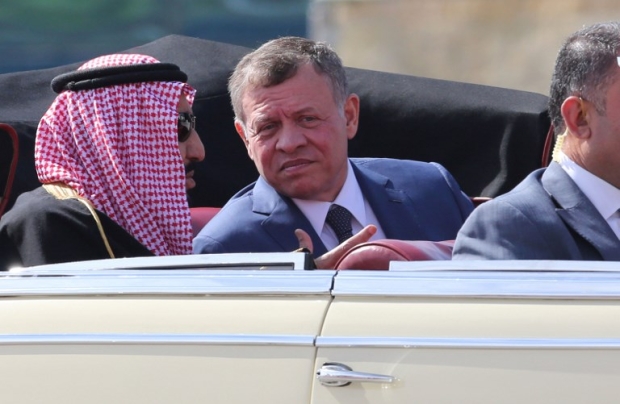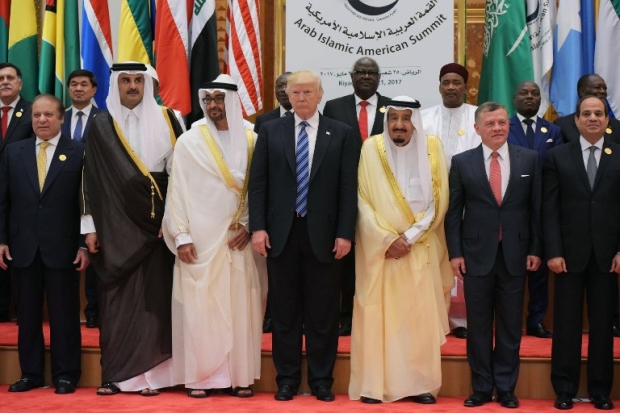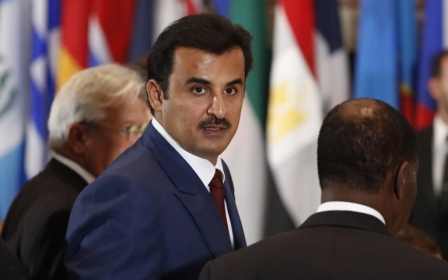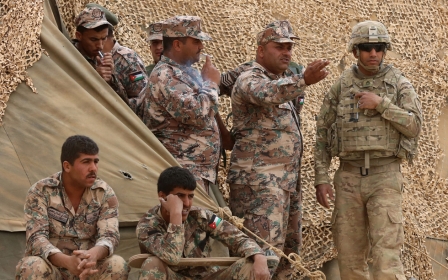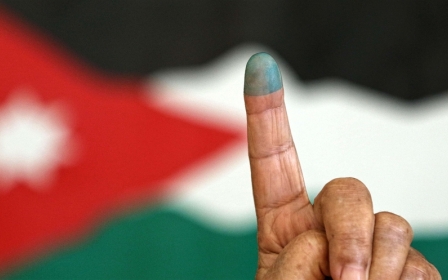The art of the hedge: Jordan between Washington, Riyadh and Doha
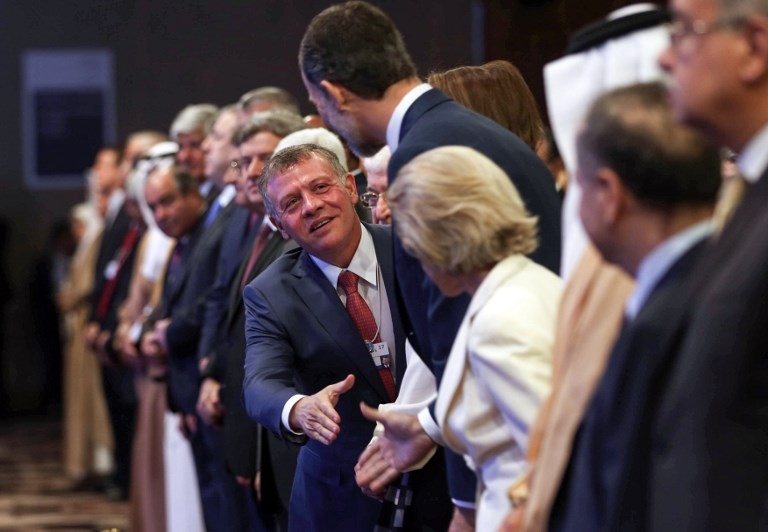
The Hashemite Kingdom of Jordan has officially taken sides with the Saudi-led coalition seeking to isolate Qatar. Yet whereas the Saudi bloc, to which Jordan belongs, slashed all diplomatic ties due to Qatar’s moderate position on Iran and support for the Muslim Brotherhood and other Islamist movements, the Jordanian follow-up has been far weaker.
New uncertainty clouds the reliability of this US-Saudi axis, and wealthy Qatar could well support an ailing Jordan in the future
While Amman slightly downgraded diplomatic relations with Doha and revoked Al Jazeera’s broadcasting license, almost everything else is unchanged. No Qatari has been asked to leave Jordan save the ambassador. Contrasting with the Gulf airlines, Royal Jordanian has not cancelled flights to Doha. Unlike in Saudi Arabia and Bahrain, Jordanians can still access Al Jazeera and other Qatari-based media online. And whereas the United Arab Emirates declared expressing sympathy with Qatar to be a crime, Jordanians have openly criticised their government’s actions.
Jordan’s response has been tepid because it must hedge its position when betting on regional winners and losers given its inherent weakness. Jordan traditionally projects a foreign policy that reflects the goal of maximising regime security: capture economic aid and military protection from foreign powers such as the US by exploiting its ability to help achieve their strategic interests.
For decades, Jordan’s winning hand was geography. Bordering Israel, Syria, and Iraq, it could credibly convince the West that its cooperation and protection were necessary on multiple fronts like peace with Israel, the invasion of Iraq, and the Syrian civil war.
Today, however, Jordan’s trump card is not working with Trump. Amman’s importance is fading, with Washington looking instead to Saudi Arabia to maintain regional order through Gulf security by leading the fight against Iran. New uncertainty clouds the reliability of this US-Saudi axis, and wealthy Qatar could well support an ailing Jordan in the future. Herein lies the art of hedging.
Puzzling policy break
Historically, it would seem logical for Jordan to adopt the Saudi bloc’s scorched-earth policy against Qatar.
First, Amman helped knit together the alliance of Sunni Arab states in the first place as it became party to the region’s current sectarian rift, pitting this Western-backed, Israeli-endorsed coalition against Iran and its clients like Syria and Hezbollah. After all, it was King Abdullah who warned the West about this “Shia crescent” engulfing the Arab world more than a decade ago.
In Syria, where the Saudi-Iranian split has played out most violently, Jordan undertook many initiatives for its coalition short of declaring war on the Assad regime, from hosting rebel training camps and running arms supply routes to operating a secretive multinational military command centre. One payoff of this foreign policy strategy has been closer ties with the Gulf Cooperation Council since the Arab Spring. From 2012 to 2016, Jordan received $5bn in GCC economic aid, mostly from Saudi Arabia, Kuwait and the Emirates.
In 2002, Qatar sentenced to death Jordanian journalist Firas Majali on espionage charges. Though he was later pardoned, the issue triggered fury among Majali’s tribe in Jordan – a tribe renowned for its political service to the monarchy. In 2006, Qatar also broke with Arab consensus in backing Ban Ki-Moon rather than Jordan’s Prince Zeid bin Ra‘ad for next UN secretary-general. Years later, Jordan threatened to shutter Al-Jazeera after its critical treatment of Jordanian political affairs.
Inversely, Qatar has leveraged its own punishments upon Jordan. For instance, it withheld some of its portion of the GCC aid package, and in the past threatened to deport the nearly 40,000 Jordanians working there. In 2012, it allowed them to stay only after Abdullah agreed to receive Meshaal for his first return visit.
These factors suggest that, while nobody expected Jordan to defend Qatar, its refusal to embrace the Saudi bloc’s extreme anti-Qatar campaign is all the more puzzling. In hedging its position, though, Amman has taken into account alarming uncertainty about its future role in any regional order lead by the US-Saudi axis.
Diminished returns
First, despite enthusiasm for Trump – King Abdullah visited him twice in his first 100 days, more than any other Middle East leader – Jordan has reaped little favour with the new administration.
For instance, the Islamic State intelligence that Trump controversially leaked to Russia likely came from Jordan, not Israel. This is a disconcerting revelation given the normally close relations between the CIA and Jordanian intelligence, and the expectations of privileged information that comes from within.
Trump’s proposed US budget for 2018 includes a potential 20 percent cut in Amman’s annual economic aid
Trump’s early promises to move the US embassy to Jerusalem likewise raised fears in Jordan, as the move could have catalysed large-scale protests by its Palestinian-majority population. The White House backed down from its pledge, but not before infuriating the entire Jordanian Foreign Ministry.
Finally, Trump’s proposed US budget for 2018 includes a potential 20 percent cut in Amman’s annual economic aid. Even if this fails to clear the Congressional hurdle, it is notable that Jordan could not convince the White House to increase its annual $1bn US aid baseline after 2017 – a request years in the making, given the steep costs of hosting nearly a million Syrian refugees.
Second, Jordan has also seen its political value diminish with its GCC allies in the clearest possible way, through aid. The $5bn GCC aid package that concluded in 2016 has not been renewed. Indeed, Jordanian officials spent much of the Arab League summit they hosted last March trying to convince Saudi Arabia and the other wealthy oil exporters to furnish more funds and investments, but with little success.
Economic assistance has security implications for Amman given its unmitigable spending on big-ticket items like salaries, pensions, subsidies, and the military. Indeed, it was the delay of Saudi aid in August 2012 (rumoured as punishment for Amman’s refusal to militarily intervene in Syria) that forced a nearly insolvent Jordanian treasury to turn instead to the IMF; the resulting austerity measures instigated ferocious rioting across the kingdom.
End of an era?
Such waning strategic visibility reflects more troubling shifts in the regional landscape, revolving around Washington and Riyadh. With its uncritical endorsement of Saudi Arabia, Bahrain and the Emirates, the Trump White House has broken with the policy of the Obama administration. Gone are even symbolic concerns about democracy and political reforms.
The era of Jordan possessing outsized geopolitical value is drawing to a close
Transpiring instead is a crude repeat of the Nixon Doctrine in the reliance upon heavily armed regional clients like Saudi Arabia to protect US interests abroad. The Riyadh summit in May signalled this, but it also underscored a more vexing problem.
Over the past two decades, the US direly needed Jordan because its location and logistics were ideal for dealing with the Israeli-Palestinian conflict, waging the war on terror, invading Iraq, and shaping the Syrian conflict. That era of Jordan possessing outsized geopolitical value is drawing to a close, because Trump’s more singular focus has been to contain Iran while waiting for the Syrian war to subside.
This new Gulf-oriented focus demotes the kingdom down the strategic pecking order, injecting deep uncertainty into what was once an unassailable position as Washington’s premier Arab ally. It makes little sense to fully commit to the Saudi bloc’s most extreme positions without guaranteeing this would also safeguard its well-being through more aid.
Similarly, estranging Qatar completely does not achieve any greater security because it would foreclose the possibility of Doha being a closer ally and aid donor. It ignores the fact that nothing linked to this crisis – Iran, the Muslim Brotherhood, Al Jazeera – realistically poses a credible threat to Jordanian stability. Further, for all of its past tension, Jordanian-Qatari relations have never approached the level of animosity seen in today’s emergency separating Doha from the rest of the GCC.
Finally, Qatar hardly fits the mould of the rogue, terror-supporting pariah alleged by the Saudi bloc. It is much more difficult to sever ties with an economically robust state with healthy international ties, especially in education and commerce.
Jordan’s last major foreign policy disaster was the 1990-91 Gulf War, when it shocked the world by supporting Iraq. The Hashemite palace paid dearly for the mistake, and needed a decade to fully restore its Western alliances and Gulf standing. That episode also left the starkest lesson of all: for Jordanian foreign policy to succeed, there must be clarity about what Amman will gain and lose by adopting the stance of its allies. Since Trump took office, that clarity has been lost.
- Sean L Yom is Associate Professor of Political Science. His research broadly focuses on authoritarianism, democracy, and development in the Middle East and North Africa. He as published widely on post-colonial state formation, the dynamics of regime durability, and strategic implications for US foreign policy. He travels frequently to the Arab world, especially Morocco and Jordan. He received his Ph.D. at Harvard.
The views expressed in this article belong to the author and do not necessarily reflect the editorial policy of Middle East Eye.
Photo: Jordan's King Abdullah II reaches out to shake hands with King Felipe VI of Spain during the opening session of the World Economic Forum held in the Dead Sea resort of Shuneh, west of the Jordanian capital, Amman on 20 May 2017 (AFP).
Thias article is available in French on Middle East Eye French edition.
New MEE newsletter: Jerusalem Dispatch
Sign up to get the latest insights and analysis on Israel-Palestine, alongside Turkey Unpacked and other MEE newsletters
Middle East Eye delivers independent and unrivalled coverage and analysis of the Middle East, North Africa and beyond. To learn more about republishing this content and the associated fees, please fill out this form. More about MEE can be found here.



